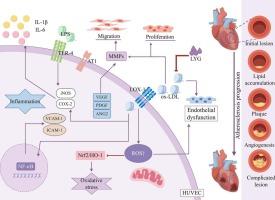罗非鱼皮抗氧化五肽抗动脉粥样硬化的机制:抑制血管生成和氧化应激
IF 4
2区 农林科学
Q2 FOOD SCIENCE & TECHNOLOGY
引用次数: 0
摘要
动脉粥样硬化(AS)是心血管疾病的病理核心,以内皮功能障碍、炎症、氧化应激和血管生成驱动的斑块不稳定为特征。本研究旨在探讨罗非鱼皮肤源性五肽Leu-Ser-Gly-Tyr-Gly (LYG)通过靶向血管生成和氧化应激对AS的治疗潜力。结果表明,LYG是一种结构稳定的抗氧化肽。LYG下调关键血管生成因子,从而抑制血管生成。激活核因子红细胞2相关因子2 (Nrf2)/血红素加氧酶1 (HO-1)通路,减轻氧化应激,降低氧化低密度脂蛋白受体(LOX-1)和血管紧张素II 1型受体(AT1)的表达,从而改善内皮功能。此外,LYG抑制ox-LDL和lps诱导的炎症介质和粘附分子的表达和释放,从而减轻动脉粥样硬化性心血管疾病(ASCVD)。该研究阐明了罗非鱼皮肤源性肽LYG通过抑制血管生成和保护内皮细胞来抗AS的潜力,同时也为罗非鱼加工副产物的高价值利用提供了新的见解。本文章由计算机程序翻译,如有差异,请以英文原文为准。

Mechanism of tilapia skin antioxidant pentapeptide on atherosclerosis: Inhibition of angiogenesis and oxidative stress
Atherosclerosis (AS), the pathological core of cardiovascular disease, features endothelial dysfunction, inflammation, oxidative stress, and angiogenesis-driven plaque instability. This study investigates the therapeutic potential of tilapia skin-derived pentapeptide Leu-Ser-Gly-Tyr-Gly (LYG) against AS by targeting angiogenesis and oxidative stress. The results show LYG is a structurally stable antioxidant peptide. LYG down-regulates key angiogenic factors, thereby inhibiting angiogenesis. It also activates the nuclear factor erythroid 2-related factor 2 (Nrf2)/heme oxygenase 1 (HO-1) pathway to reduce oxidative stress and reduces the expression of oxidized low-density lipoprotein receptor (LOX-1) and angiotensin II type 1 receptor (AT1), thereby improving endothelial function. Furthermore, LYG suppresses the expression and release of both ox-LDL- and LPS-induced inflammatory mediators and adhesion molecules, thereby mitigating atherosclerotic cardiovascular disease (ASCVD). This study elucidates the potential of tilapia skin-derived peptide LYG against AS by inhibiting angiogenesis and protecting endothelial cells, while also offering new insights into high-value utilization of tilapia processing by-products.
求助全文
通过发布文献求助,成功后即可免费获取论文全文。
去求助
来源期刊

Journal of Functional Foods
FOOD SCIENCE & TECHNOLOGY-
CiteScore
9.60
自引率
1.80%
发文量
428
审稿时长
76 days
期刊介绍:
Journal of Functional Foods continues with the same aims and scope, editorial team, submission system and rigorous peer review. We give authors the possibility to publish their top-quality papers in a well-established leading journal in the food and nutrition fields. The Journal will keep its rigorous criteria to screen high impact research addressing relevant scientific topics and performed by sound methodologies.
The Journal of Functional Foods aims to bring together the results of fundamental and applied research into healthy foods and biologically active food ingredients.
The Journal is centered in the specific area at the boundaries among food technology, nutrition and health welcoming papers having a good interdisciplinary approach. The Journal will cover the fields of plant bioactives; dietary fibre, probiotics; functional lipids; bioactive peptides; vitamins, minerals and botanicals and other dietary supplements. Nutritional and technological aspects related to the development of functional foods and beverages are of core interest to the journal. Experimental works dealing with food digestion, bioavailability of food bioactives and on the mechanisms by which foods and their components are able to modulate physiological parameters connected with disease prevention are of particular interest as well as those dealing with personalized nutrition and nutritional needs in pathological subjects.
 求助内容:
求助内容: 应助结果提醒方式:
应助结果提醒方式:


